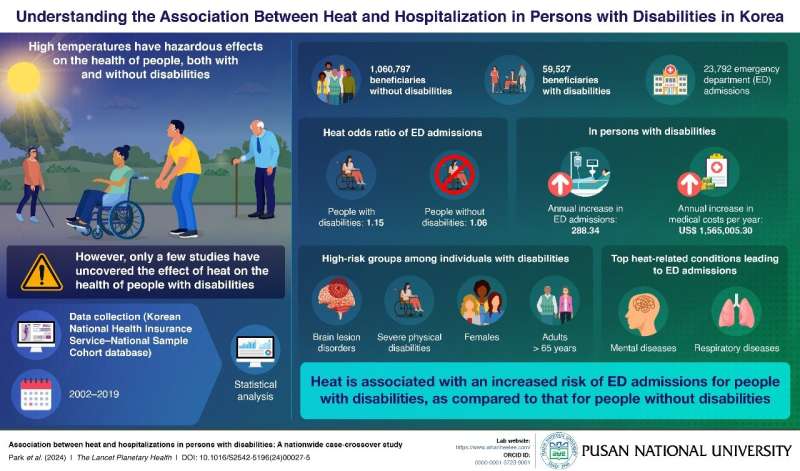
The study, conducted by researchers at Busan National University, looked at the differences in the health effects of heat between people with and without disabilities, as well as differences based on the type of disability. Photo credit: Dr. Whanhee Lee, Busan National University, South Korea
Climate change is causing global temperatures to rise sharply and more frequently, resulting in more intense heatwaves. Amid these concerns, the Intergovernmental Panel on Climate Change (IPCC) has warned that for every 0.5°C increase in temperature, heatwaves will become more intense, frequent and last longer.
Previous studies on the impacts of these changes have found that extreme heat disproportionately affects vulnerable groups, such as children, the elderly, people with chronic illnesses, and low-income families. However, despite these observations, there is limited research on the impact of high temperatures on the health of people with disabilities.
To better understand the impact of extreme heat on public health, especially on vulnerable populations such as people with disabilities, a team of researchers led by Dr. Lee Hwan of Busan National University in South Korea investigated the relationship between heat and emergency department admissions. The study, published in the Lancet Planetary Health journal, revealed disparities in hospitalizations and medical costs between people with disabilities and those without.
“Ours is a nationwide study to present scientific data on the harmful effects of heat on the health of people with disabilities,” Dr Lee said.
To this end, the researchers examined health records of 59,527 disabled and 1,060,797 non-disabled beneficiaries from the National Sample Cohort Database of the National Health Insurance Service of Korea.
The researchers used a statistical method called conditional logistic regression to examine the association between short-term exposure to high temperatures during the warm season (June to September) and hospital emergency department (ED) admissions from January 1, 2002 to December 31, 2019. The study looked at admissions for four types of disabilities: physical disabilities, brain lesion disabilities, visual disabilities, and hearing disabilities, as well as cardiovascular, genitourinary, mental, and respiratory disorders.
The findings revealed that heat exposure increases the risk of hospitalization among people with disabilities, especially due to the development of mental and respiratory illnesses. Furthermore, people with brain lesions and severe physical disabilities, women, and people aged 65 and older were found to be more susceptible to the effects of heat exposure. Overall, these results suggest that people with disabilities face 1.07 times the risk, four times the emergency room admissions, and seven times the medical costs compared to people without disabilities.
In South Korea, approximately 2.7 million people are disabled, a number that is expected to increase due to the ageing population and the rise in non-communicable diseases. In this context, the results of this study highlight the need for well-informed public health policies to support and address the specific needs of this group.
For example, these policies and decisions could include practical actions to address different disability characteristics and medical training that takes into account the diverse co-morbidities of people with disabilities and the impact of climate change on their health. Such plans would also align with the United Nations Sustainable Development Goals (SDGs) on equal access to health care and climate action.
“To our knowledge, climate change guidelines regarding people with disabilities are still limited. Our study highlights the importance of considering people with disabilities when developing climate change guidelines,” Dr Lee concludes.
Further information: Jinah Park et al. “Association between heat exposure and hospitalization among people with disabilities in South Korea: a nationwide case-crossover study.” The Lancet Planetary Health (2024). DOI: 10.1016/S2542-5196(24)00027-5
Provided by Busan National University
Source: Heatwaves hit people with disabilities harder: Study finds rise in emergency visits in South Korea (June 11, 2024) Retrieved June 12, 2024, https://medicalxpress.com/news/2024-06-harder-people-disabilities-emergency-south.html
This document is subject to copyright. It may not be reproduced without written permission, except for fair dealing for the purposes of personal study or research. The content is provided for informational purposes only.

